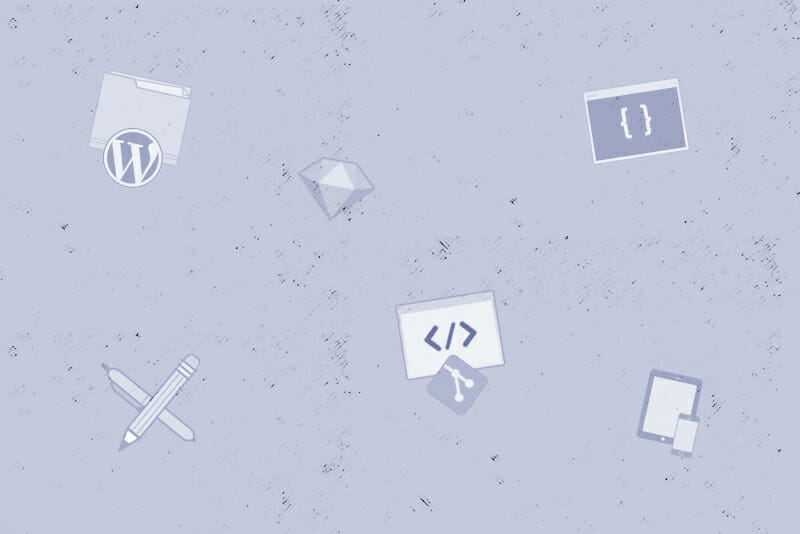The 10 Most Essential Skills for Full-Stack Developers in 2025

What is full-stack development?
Full-stack development is a hybrid role that includes both front-end and back-end development.
Front-end development covers all the visible parts of a website, webpage, or app. This could be the HTML used to create headings and links, or the CSS used to make your web content “pretty” with styling elements like fonts, colors, and different layouts. (Yes, this can include UI/UX design!)
Back-end development is the behind-the-scenes of the web world. These are the hidden elements of a web app that your users don’t see but certainly use. It’s the user authentication and authorization that ensure everyone gets the right level of access. It’s the data security and encryption that keeps sensitive information safe from the prying eyes of malicious hackers.
Think of a full-stack developer like a film director. Directors oversee everything from the screenplay and casting to cinematography and editing. Full-stack developers design and build the user-facing parts of an app while managing the server-side logic. They use a blend of information design and technical skills to ensure that our experience with their app is seamless and functional from start to finish.
Mastering this perfect blend means mastering all sorts of different technologies, frameworks, and databases, which can feel pretty intimidating. What skills should you start with?
Look, there are dozens upon dozens of skills you can learn for full-stack development, but if we’re being honest, without focus, you’re looking at least a lifetime to try and learn every single one. Instead, we’re covering 10 of the most essential skills for full-stack developers in 2025.
Table of Contents
- Skill #1: Front-End Languages and Frameworks
- Skill #2: Back-End Technologies
- Skill #3: DevOps
- Skill #4: User Interface (UI) and User Experience (UX)
- Skill #5: Cybersecurity
- Skills #6 – #10: Soft Skills
- How to Start Learning Full-Stack Development Skills
Skill #1: Front-End Languages and Frameworks
When you master front-end technology, you have the ability to transform complex concepts into engaging, user-friendly experiences. Let’s use Uber as an example. Those developers knew that they could create an app that enabled users to connect directly to drivers, instead of waiting on traditional taxis. And instead of the price being based on whether or not your driver takes the long, traffic-jammed, and fare-hiking route, your fare is provided upfront and mostly based on distance and demand. Several pain points, done and dusted, right? But the front-end technology skills you’d need to create an app like Uber aren’t just one-and-done!
There are multiple front-end developer skills to learn before claiming proficiency. Largely speaking, these front-end skills let you structure web page content in meaningful and functional ways. You can polish your creation with colors and typography while making your applications more interactive, dynamic, and responsive.
The front-end skills all full-stack developers should know include:
Programming Languages:
Front-end Frameworks/Libraries:
- React
- Vue.js
- Angular

Skill #2: Back-End Technologies
You probably saw this one coming, but front-end and back-end technologies are easily the two most essential skills for full-stack developers. While front-end technology is the leather seats, paint job, and chrome rims of a car, back-end technology is the engine and mechanical parts that keep your car driving. It’s what makes your apps powerful, scalable, and secure.
Mastering back-end technologies means creating sophisticated, scalable apps. It means working with frameworks that streamline your development process because they’re extremely efficient and offer reusable, time-saving, and — most importantly — code-saving components. Being proficient in back-end skills also means having a strong command of databases that let you manage and request data.
If you need to master back-end development, start with this list of languages, frameworks, and databases:
Back-end Languages:
Back-end Frameworks:
- Node.js
- Express.js
- Django
- Ruby on Rails
- Flask
Database Systems:
- SQL Databases (MySQL, PostgreSQL, SQLite)
- NoSQL Databases (MongoDB, Redis, CouchDB)
Skill #3: DevOps

DevOps is a game-changing approach that fuses development (dev) and operations (ops) together to streamline and automate software delivery. DevOps is what helps full-stack developers bridge the gap between creating and running applications, making sure that every line of code transitions smoothly from development to production.
Version control is crucial for tracking and managing code changes while collaborating with teams on platforms like GitHub. With continuous integration and continuous deployment (CI/CD), development teams can automate and speed up the entire app lifecycle — from coding to deployment. Utilizing cloud services can make it a lot easier to scale your apps as they grow. DevOps practices like containerization help ensure consistent environments for your apps so they can run smoothly across different operating systems. For example, DevOps is what makes it possible for an app like PayPal to run as smoothly on iOS systems as it does on Android.
Ultimately, DevOps creates a continuous loop that allows developers to create apps that are more powerful, reliable, and faster to develop. Some DevOps skills worth mastering include:
- CI/CD Pipelines and Tools (Jenkins, Circle CI, GitLab)
- Containerization (Docker)
- Cloud Platforms (Amazon Web Services, Microsoft Azure, Google Cloud)
- Version Control (Git and Git Platforms)
Skill #4: User Interface (UI) and User Experience (UX)
Want to know one of the biggest mistakes a full-stack developer could make? Building an app without considering how your users will interact with it. You might end up with a technical masterpiece that’s a user’s nightmare! User interface (UI) and user experience (UX) skills are critical to full-stack development because those are the principles that ensure that every element is designed with your user in mind. By understanding UI/UX principles, you can use your skills to create apps that work flawlessly, boost engagement, and resonate with your users.
Skill #5: Cybersecurity
When building websites and applications, cybersecurity cannot be an afterthought. It’s the only way to protect your technology from malicious attacks, data theft, and unauthorized access. Cybersecurity not only protects your system, but it also protects your users. It helps build trust that their information won’t be compromised. Trust me, they’ll want to know that their home address and debit card number aren’t magically floating into criminal hands.
Cybersecurity skills are one of the most essential skills in full-stack development because they safeguard your apps and user data against threats. Here’s how: authentication and authorization maintains control over user permissions and roles to ensure that the right people can access different parts of your app. System logging and monitoring tracks real-time activity and flags potential security breaches before they get worse. Experience with data security means having a strong command of concepts like encryption and transport layer security (TLS) to ensure compliance with data protection regulations.
And while all of these skills are great, an essential, ongoing skill is keeping up with security best practices. Cybersecurity doesn’t end once you know how to integrate these measures into your apps! Some hackers are chomping at the bit to get their hands on personal data, and you need to stay up-to-date with the latest practices and perform regular security assessments to keep your app, user information, and digital assets secure. Even if your intended app doesn’t have things like payment information, it’s still important to safeguard your users’ data.
Some of the cybersecurity skills you should focus on are:
- Authentication and Authorization
- Data Security and Protocols (Encryption, SSL/TLS protocols)
- Data Compliance and Regulatory Knowledge
- System Logging and Monitoring
- Security and Vulnerability Assessment
Skills #6 – #10: Soft Skills

Okay, yeah, we’re cheating a little bit and lumping some skills together. When creating the perfect resume (especially in tech!), many of us focus on showcasing our hard skills — our technical knowledge, education, and hands-on experience. We go out of our way to highlight what we’ve learned, but here’s the twist. Employers definitely value these hard skills, but they’re also on the hunt for something a bit less tangible and equally important.
Soft skills are, in general, the non-technical, interpersonal skills that support how you do your job. These are the skills that develop how you communicate, collaborate, and work through the complexities of your work environment. Imagine knowing every trick in the book for front-end and back-end technologies but not having the critical thinking skills to troubleshoot its issues effectively, or communicate your way through app dev. Sounds like a nightmare — for you and potential employers.
Some of the best soft skills that will serve you well in full-stack development include:
- Critical thinking and problem-solving: The ability to learn, analyze, interpret, and apply information to identify connections and make reasonable judgments.
- Communication and collaboration skills: Working seamlessly with other developers while exchanging information, opinions, and thoughts through written, verbal, or non-verbal ways.
- Time Management: The ability to balance multiple tasks and projects efficiently to ensure they’re completed on time.
- Adaptability: The ability to quickly adjust to new technologies and methodologies, for example, switching between different programming languages and integrating new advancements — tools, frameworks, and best practices — into your work.
- Analytical Skills: The ability to assess complex information, break down problems, understand systems, and develop solutions.
How to Start Learning Full-Stack Development Skills
There’s no “one size fits all” journey for diving into full-stack development, but we hope this post gets your journey started with a step in the right direction. Build a solid foundation with the basics — HTML, CSS, and JavaScript. Then move on to exploring back-end technologies and diving into hands-on learning and projects. Your path to becoming a skilled full-stack developer requires a mixture of curiosity, continuous learning, and practical application.
Anddddddd you can get all that and more with the Skillcrush Break Into Tech – Full Stack Developer Career Track! It’s an online course that teaches you the most important programming languages for full-stack development, like HTML and Python. The program doesn’t stop at teaching, it gives you the tools to turn your new skills into a career. With personalized resume reviews, mock interviews, and career counseling sessions, it’s your all-in-one ticket to learning and landing a job in tech.






